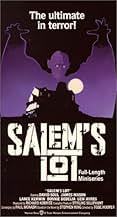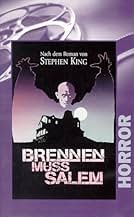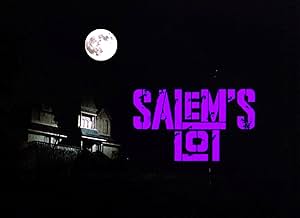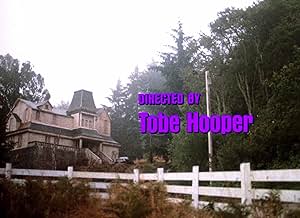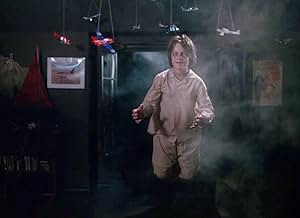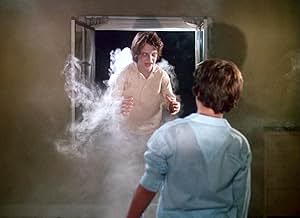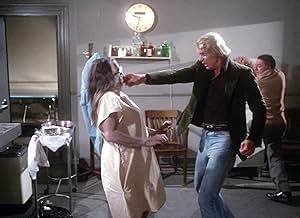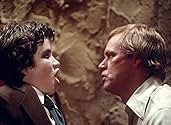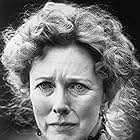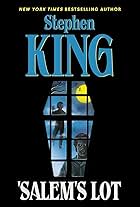A novelist and a young horror fan attempt to save a small New England town which has been invaded by vampires.A novelist and a young horror fan attempt to save a small New England town which has been invaded by vampires.A novelist and a young horror fan attempt to save a small New England town which has been invaded by vampires.
- Nominated for 3 Primetime Emmys
- 4 nominations total
Browse episodes
Featured reviews
This is one of the most richly atmospheric films in horror, an article of pure latenight seduction and phosphorescent darkness.
Atmospheric not in the sense that a dry ice machine has pumped a catacomb full of haze and cobwebs are strategically placed in some dark corner, but as a place lived, with naturally dark corners and tangible portents: the old dark house on the hill breathing evil, the antique shop downtown, all velvety smell and musty colors, the small town lined with porticoes bathed in the quiet of a lazy night, yet harboring secrets and vice from inside. Prying eyes staring from behind a curtain.
Oh, at some point vampires come flying through the window, and it's still fine by me, it's one of the better vampire films and at 3 hours it's better fleshed than most of them; but I am just not attuned to the whole vampire lore so I leave this part to be enjoyed best by the traditional horror fan. It is actually one of the more potent retellings of the most familiar story in this field, I was pleasantly surprised to see that it was not quite Dracula but that older film with longer shadows, so I will not spoil the discovery for you.
But the first part intrigues me in stranger ways, more suggestive, with menace that goes unspoken. The small-town facade that would later resurface in Twin Peaks.
There is a notion that matters in all this, but which is not pursued at all; the writer who feels from his perspective that it was his presence that awakened evil, it's fitting that it's coming from a writer because it's a self-centered, imaginative notion, but which from our end we know is bogus. Evil was already afoot, and was never centered around him. But he wistfully imagines himself at the center so he can write about it.
So I don't know what happened with Tobe Hooper. He was never very elegant with a camera, the way Argento was or occasionally Carpenter, but he was unmatched in his feel for the aural qualities of film. He could make a room hum with evil. My guess is that, being an intuitive maker, the feel came and went, or he forgot how to tap into it (you can see as early as Eaten Alive how he seems to be desperately trying to capture again the muse that gave him Texas Massacre). Or he plainly stopped actively chasing after the right material.
This was just right for him. Only Kubrick has better adapted Stephen King to my mind.
Atmospheric not in the sense that a dry ice machine has pumped a catacomb full of haze and cobwebs are strategically placed in some dark corner, but as a place lived, with naturally dark corners and tangible portents: the old dark house on the hill breathing evil, the antique shop downtown, all velvety smell and musty colors, the small town lined with porticoes bathed in the quiet of a lazy night, yet harboring secrets and vice from inside. Prying eyes staring from behind a curtain.
Oh, at some point vampires come flying through the window, and it's still fine by me, it's one of the better vampire films and at 3 hours it's better fleshed than most of them; but I am just not attuned to the whole vampire lore so I leave this part to be enjoyed best by the traditional horror fan. It is actually one of the more potent retellings of the most familiar story in this field, I was pleasantly surprised to see that it was not quite Dracula but that older film with longer shadows, so I will not spoil the discovery for you.
But the first part intrigues me in stranger ways, more suggestive, with menace that goes unspoken. The small-town facade that would later resurface in Twin Peaks.
There is a notion that matters in all this, but which is not pursued at all; the writer who feels from his perspective that it was his presence that awakened evil, it's fitting that it's coming from a writer because it's a self-centered, imaginative notion, but which from our end we know is bogus. Evil was already afoot, and was never centered around him. But he wistfully imagines himself at the center so he can write about it.
So I don't know what happened with Tobe Hooper. He was never very elegant with a camera, the way Argento was or occasionally Carpenter, but he was unmatched in his feel for the aural qualities of film. He could make a room hum with evil. My guess is that, being an intuitive maker, the feel came and went, or he forgot how to tap into it (you can see as early as Eaten Alive how he seems to be desperately trying to capture again the muse that gave him Texas Massacre). Or he plainly stopped actively chasing after the right material.
This was just right for him. Only Kubrick has better adapted Stephen King to my mind.
I recently read Stephen Kings novel (one of his first major successes), so I thought of checking out this mini-series. It's by now more than 40 years old, and that of course shows. The pace is slower than we are now used to (the overlong almost three and a half hours didn't help with that) and the special effects are modest.
But director Tobe Hooper created a pleasantly creepy atmosphere, building up the tension gradually but very effectively; the photography is at times great (the scene of the undertaker on the graveyard for instance); the eerie musical score is exactly right; and there is some solid acting, especially by David Soul and by old school actor James Mason, who excels in his aloof and over-civilized attitude. Some scenes, like the floating vampires by the windows, now make a rather simple impression, but the make-up of the master vampire, like a Nosferatu in colour, is absolutely top-notch scary!
The series follows the novel pretty closely, they only brought back the amount of characters a bit, probably to keep everything more surveyable. The epilogue is essentially different from the book and comes a bit out of the blue, but as an (open) closure to the movie it worked fine enough.
But director Tobe Hooper created a pleasantly creepy atmosphere, building up the tension gradually but very effectively; the photography is at times great (the scene of the undertaker on the graveyard for instance); the eerie musical score is exactly right; and there is some solid acting, especially by David Soul and by old school actor James Mason, who excels in his aloof and over-civilized attitude. Some scenes, like the floating vampires by the windows, now make a rather simple impression, but the make-up of the master vampire, like a Nosferatu in colour, is absolutely top-notch scary!
The series follows the novel pretty closely, they only brought back the amount of characters a bit, probably to keep everything more surveyable. The epilogue is essentially different from the book and comes a bit out of the blue, but as an (open) closure to the movie it worked fine enough.
This movie is not for those people who want to watch busty teenager chicks get slashed and stabbed to death by tall guys with hockey masks and machetes. For that kind of elevated thrill, rent "Summer Camp 5" or something. But for those of you who want a horror movie worthy of the name, rent "Salem's Lot:the mini series". This series scared the hell out of me when I was younger, and very little has changed. David Soul gives the performance of his career as writer Ben Mears and absolutely becomes the character. James Mason is genuinely chilling as Straker, the humorous but not quite well intentioned antiques salesman and, uh...'partner' of Mr. Barlow, aka Nosferatu. I've never seen a horror movie that builds up an atmosphere of suspense and fear as effectively as this one does. It is true that King didn't like it, and as far as I'm concerned that's more to its credit--let's remember that this is the guy behind that illustrious cinematic masterpiece "Maximum Overdrive". The book is one more trashy vampire novel among many, as forgettable as it is trite. Hooper transforms King's boring,oh-it's-just-Dracula-again run of the mill vampire into a mysterious, terrifying monster in the tradition of authentic horror. Don't just watch it, buy it. A necessity.
First let me suggest to see the original miniseries version if at all possible. The "movie" version is horribly chopped. The remaining pieces don't fit together and leave gaping holes (such as, "what happened to Susan?")
Salem's Lot is an almost unknown milestone in horror films. This superb combination of the talents of Tobe Hooper and Stephen King bridges the gap between the Hammer-style films of the 60's and the modern vampire films. Two things to especially note:
(1) This takes place in Everytown, USA and the cinematography reflects the ordinary turned extraordinary (which is the same effect achieved by Bram Stoker's original writing for the audience of his time.) It begins looking almost like a Rockford Files episode and goes dark from there. But even the climax in the evil Marsten house looks *real*, just as you would imagine an old decrepit house to look. You can almost smell the dust. Hey, this was the seventies, the decade of naturalistic lighting. Everything coming out of Hollywood now looks just that - like Hollywood.
(2) It is a shame that anyone today viewing Salem's Lot already knows that is about vampires because when it first aired on TV, the unknown aspect is what made the first half so creepy. Now you just sit there waiting for the vampires to show up. (If I thought that even one person might read this without knowing it was about vampires, I wouldn't write this.) The advertising for the show made no mention of vampires and the effect worked well. I was ten years old when I first saw this. I had seen at least a dozen other vampire flicks - Noseratu, Lugasi, the Hammer films - and I had no clue that this was about vampires. All I knew was that something creepy was going in this town and it was getting creepier and creepier. Only in the second episode when you see someone get bit in the neck did it finally click, "Oh my god, they're vampires." You realize it right about the same time that the main characters do. Highly effective.
Also, superb performances by David Soul, Lew Ayres, James Mason.
Salem's Lot is an almost unknown milestone in horror films. This superb combination of the talents of Tobe Hooper and Stephen King bridges the gap between the Hammer-style films of the 60's and the modern vampire films. Two things to especially note:
(1) This takes place in Everytown, USA and the cinematography reflects the ordinary turned extraordinary (which is the same effect achieved by Bram Stoker's original writing for the audience of his time.) It begins looking almost like a Rockford Files episode and goes dark from there. But even the climax in the evil Marsten house looks *real*, just as you would imagine an old decrepit house to look. You can almost smell the dust. Hey, this was the seventies, the decade of naturalistic lighting. Everything coming out of Hollywood now looks just that - like Hollywood.
(2) It is a shame that anyone today viewing Salem's Lot already knows that is about vampires because when it first aired on TV, the unknown aspect is what made the first half so creepy. Now you just sit there waiting for the vampires to show up. (If I thought that even one person might read this without knowing it was about vampires, I wouldn't write this.) The advertising for the show made no mention of vampires and the effect worked well. I was ten years old when I first saw this. I had seen at least a dozen other vampire flicks - Noseratu, Lugasi, the Hammer films - and I had no clue that this was about vampires. All I knew was that something creepy was going in this town and it was getting creepier and creepier. Only in the second episode when you see someone get bit in the neck did it finally click, "Oh my god, they're vampires." You realize it right about the same time that the main characters do. Highly effective.
Also, superb performances by David Soul, Lew Ayres, James Mason.
I was fourteen years old when this film was released, and it was really a shocker for its time. Although I can see the points raised by detractors of this film, nevertheless, it is, in my opinion, one of the most truly terrifying movies I have ever seen. The scenes in which first Ralphie and then Danny Glick appear in windows at night, scratching to be let in, were utterly horrifying, as were the scenes with Mike Ryerson in Jason Burke's guest bedroom ("Looooook at me ... I will see you sleep like the dead, teacher") and Marjorie Glick in the mortuary. Along with the original "Halloween," this is a film that really, really scared me, and I feel that a key element was the lack of gore (which is probably a disappointment to younger viewers used to explicit splatter). The nonverbal dialogue of expressions and actions, the music, and the significantly occurring silences resulted in the suspense which makes a film truly frightening in my opinion.
Having said this, I do feel that the book was much, much better than the movie, and I would recommend it as one of the best vampire stories ever written (sorry, Anne Rice, but it's true). But let's be fair and realistic. It's a rare film that excels the book on which it was based. Not one of Stephen King's wonderfully (and horribly) imaginative works has EVER been committed to film in a way that has equaled the written work. Never, ever, EVER. That is something that will just never happen. If it were possible, then nobody would bother to read his books, he would become a screenwriter, and that would be a real loss for the horror genre.
Having said this, I do feel that the book was much, much better than the movie, and I would recommend it as one of the best vampire stories ever written (sorry, Anne Rice, but it's true). But let's be fair and realistic. It's a rare film that excels the book on which it was based. Not one of Stephen King's wonderfully (and horribly) imaginative works has EVER been committed to film in a way that has equaled the written work. Never, ever, EVER. That is something that will just never happen. If it were possible, then nobody would bother to read his books, he would become a screenwriter, and that would be a real loss for the horror genre.
Storyline
Did you know
- TriviaThe exterior for the Marsten House was actually a full-scale facade built upon a smaller pre-existing hill-top house. In total, the facade cost the production an estimated $100,000 dollars to build. In 1979, an entire house (including the interiors) could have been made for that amount.
- GoofsWhen the younger Glick brother is abducted (and later presumably murdered by Barlow) he's wearing a jacket, t-shirt, dungarees and sneakers. After which, he appears to his brother wearing pajamas.
- Crazy creditsThe text of the opening credits appear and dissolve piece by piece into each other in a jigsaw puzzle fashion.
- Alternate versionsSalem's Lot originally aired as a two-night mini-series with the first episode airing on 17 November 1979 and the second episode airing the following week on 24 November 1979.
- ConnectionsFeatured in Stairs (1986)
Details
Contribute to this page
Suggest an edit or add missing content



